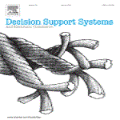Recent work has shown that, in classification tasks, it is possible to design decision support systems that do not require human experts to understand when to cede agency to a classifier or when to exercise their own agency to achieve complementarity$\unicode{x2014}$experts using these systems make more accurate predictions than those made by the experts or the classifier alone. The key principle underpinning these systems reduces to adaptively controlling the level of human agency, by design. Can we use the same principle to achieve complementarity in sequential decision making tasks? In this paper, we answer this question affirmatively. We develop a decision support system that uses a pre-trained AI agent to narrow down the set of actions a human can take to a subset, and then asks the human to take an action from this action set. Along the way, we also introduce a bandit algorithm that leverages the smoothness properties of the action sets provided by our system to efficiently optimize the level of human agency. To evaluate our decision support system, we conduct a large-scale human subject study ($n = 1{,}600$) where participants play a wildfire mitigation game. We find that participants who play the game supported by our system outperform those who play on their own by $\sim$$30$% and the AI agent used by our system by $>$$2$%, even though the AI agent largely outperforms participants playing without support. We have made available the data gathered in our human subject study as well as an open source implementation of our system at https://github.com/Networks-Learning/narrowing-action-choices .
翻译:暂无翻译



